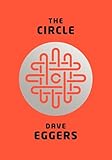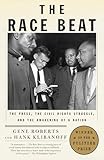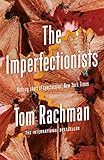
 One thing I’ve learned in grad school is that journalists love to talk about journalism. My friends couldn’t go out to Irish dive bar near campus without discussing the latest New York Times article, so after I finished my last drink I would escape into fiction. I devoured more John Green novels this summer than I should admit (Paper Towns is my favorite) and carried around Dave Eggers’s The Circle along with my text books to sneak in a few minutes of reading between classes. Yet ironically, the best books I read this year were about journalism.
One thing I’ve learned in grad school is that journalists love to talk about journalism. My friends couldn’t go out to Irish dive bar near campus without discussing the latest New York Times article, so after I finished my last drink I would escape into fiction. I devoured more John Green novels this summer than I should admit (Paper Towns is my favorite) and carried around Dave Eggers’s The Circle along with my text books to sneak in a few minutes of reading between classes. Yet ironically, the best books I read this year were about journalism.
 Gene Roberts and Hank Klibanoff’s Pulitzer Prize-winning The Race Beat: The Press, the Civil Rights Struggle, and the Awakening of a Nation tells the story of how the press shaped the Civil Rights Movement. Reading the book for a class opened my eyes to a lot of truths — how whitewashed my high school education on the Movement was, that objectivity never really existed (and that’s probably for the best), and how powerful good journalism can be. I’m not just talking about how influential good reporting can be, but how important the writing of it is, and it applies to the authors of this book as much as their subjects. Klibanoff and Roberts treat the journalists like characters in a novel, complete with what suits they were wearing when they reported the integration of the Little Rock Public Schools to what they drank afterward. The Race Beat could have been a dry list of forgotten bylines and protests, but these personal details made it a sweeping narrative with heroes and villains, tragedy and victory, and even nuance. Ultimately, Klibanoff and Roberts show that good reporting takes us back to the individuals because they are the story.
Gene Roberts and Hank Klibanoff’s Pulitzer Prize-winning The Race Beat: The Press, the Civil Rights Struggle, and the Awakening of a Nation tells the story of how the press shaped the Civil Rights Movement. Reading the book for a class opened my eyes to a lot of truths — how whitewashed my high school education on the Movement was, that objectivity never really existed (and that’s probably for the best), and how powerful good journalism can be. I’m not just talking about how influential good reporting can be, but how important the writing of it is, and it applies to the authors of this book as much as their subjects. Klibanoff and Roberts treat the journalists like characters in a novel, complete with what suits they were wearing when they reported the integration of the Little Rock Public Schools to what they drank afterward. The Race Beat could have been a dry list of forgotten bylines and protests, but these personal details made it a sweeping narrative with heroes and villains, tragedy and victory, and even nuance. Ultimately, Klibanoff and Roberts show that good reporting takes us back to the individuals because they are the story.
 Tom Rachman follows a similar ideal in The Imperfectionists. This stories-as-novel focuses on a dwindling English-language newspaper in Rome. We learn about the newsroom through its beleaguered staff as each chapter centers on a different journalist from the paranoid copy editor Ruby Zaga to the naive Cairo stringer, Winston Cheung. Each story is so strong it could stand alone, but Rachman interweaves them in a similar fashion to A Visit from the Goon Squad with unsettling surprises revealed as the stories intersect. Eventually, we realize that the protagonist was the unnamed paper all along. Yet what unites the book is its economical but sharply observed prose. Rachman cuts to the bone like a good reporter would, but he writes to almost Joycean epiphany and parses people better than the corrections editor can parse a sentence. As one character notes, “Journalism is a bunch of dorks pretending to be alpha males;” and that’s what makes this book so striking. Although any journalist can appreciate a caricatured view of a paper (I certainly did), fundamentally The Imperfectionists is a story of loners, misplaced ambition, and what it’s like to be an underdog, which is something we can all relate to — newsroom or not.
Tom Rachman follows a similar ideal in The Imperfectionists. This stories-as-novel focuses on a dwindling English-language newspaper in Rome. We learn about the newsroom through its beleaguered staff as each chapter centers on a different journalist from the paranoid copy editor Ruby Zaga to the naive Cairo stringer, Winston Cheung. Each story is so strong it could stand alone, but Rachman interweaves them in a similar fashion to A Visit from the Goon Squad with unsettling surprises revealed as the stories intersect. Eventually, we realize that the protagonist was the unnamed paper all along. Yet what unites the book is its economical but sharply observed prose. Rachman cuts to the bone like a good reporter would, but he writes to almost Joycean epiphany and parses people better than the corrections editor can parse a sentence. As one character notes, “Journalism is a bunch of dorks pretending to be alpha males;” and that’s what makes this book so striking. Although any journalist can appreciate a caricatured view of a paper (I certainly did), fundamentally The Imperfectionists is a story of loners, misplaced ambition, and what it’s like to be an underdog, which is something we can all relate to — newsroom or not.
More from A Year in Reading 2013
Don’t miss: A Year in Reading 2012, 2011, 2010, 2009, 2008, 2007, 2006, 2005
The good stuff: The Millions’ Notable articles
The motherlode: The Millions’ Books and Reviews
Like what you see? Learn about 5 insanely easy ways to Support The Millions, and follow The Millions on Twitter, Facebook, Tumblr.










